Finanzmärkte
Die Abteilung „Finanzmärkte“ am IWH befasst sich mit dem institutionellen Wandel von Finanzsystemen in Europa. Die Forschung der Abteilung beschäftigt sich mit den Ursachen und Wirkungen der internationalen Tätigkeit von Banken und anderen Finanzintermediären, dem Zusammenhang zwischen Marktstrukturen im Bankensektor und gesamtwirtschaftlicher Stabilität, Ansteckungseffekten auf internationalen Finanzmärkten sowie der Rolle des Finanzsektors für die Realwirtschaft.
Hierbei spielen insbesondere Wechselwirkungen zwischen dem Finanzsektor und Wachstums- und Innovationsprozessen in der Realwirtschaft eine Rolle. Methodisch zielt die Forschung der Abteilung auf die integrierte Betrachtung von Anpassungen auf der Mikro- und Makroebene sowie die Evaluation wirtschaftspolitischer Maßnahmen zur Regulierung von Finanzmärkten.
IWH Research Seminar in Economics
Ihr Kontakt

Leiter - Abteilung Finanzmärkte
Referierte Publikationen

The Effects of Antitrust Laws on Horizontal Mergers: International Evidence
in: Journal of Financial and Quantitative Analysis, im Erscheinen
Abstract
This study examines how antitrust law adoptions affect horizontal merger and acquisition (M&A) outcomes. Using the staggered introduction of competition laws in 20 countries, we find antitrust regulation decreases acquirers’ five-day cumulative abnormal returns surrounding horizontal merger announcements. A decrease in deal value, target book assets, and industry peers' announcement returns are consistent with the market power hypothesis. Exploiting antitrust law adoptions addresses a downward bias to an estimated effect of antitrust enforcement (Baker (2003)). The potential bias from heterogeneous treatment effects does not nullify our results. Overall, antitrust policies seem to deter post-merger monopolistic gains, potentially improving customer welfare.

Aggregate Dynamics with Sectoral Price Stickiness Heterogeneity and Aggregate Real Shocks
in: Journal of Money, Credit and Banking, im Erscheinen
Abstract
Abstract This paper investigates the relationship between heterogeneity in sectoral price stickiness and the response of the economy to aggregate real shocks. We show that sectoral heterogeneity reduces inflation persistence for a constant average duration of price spells, and that inflation persistence can fall despite duration increases associated with increases in heterogeneity. We also find that sectoral heterogeneity reduces the persistence and volatility of interest rate and output gap for a constant price spells duration, while the qualitative impact on inflation volatility tends to be positive. A relevant policy implication is that neglecting price stickiness heterogeneity can impair the economic dynamics assessment.
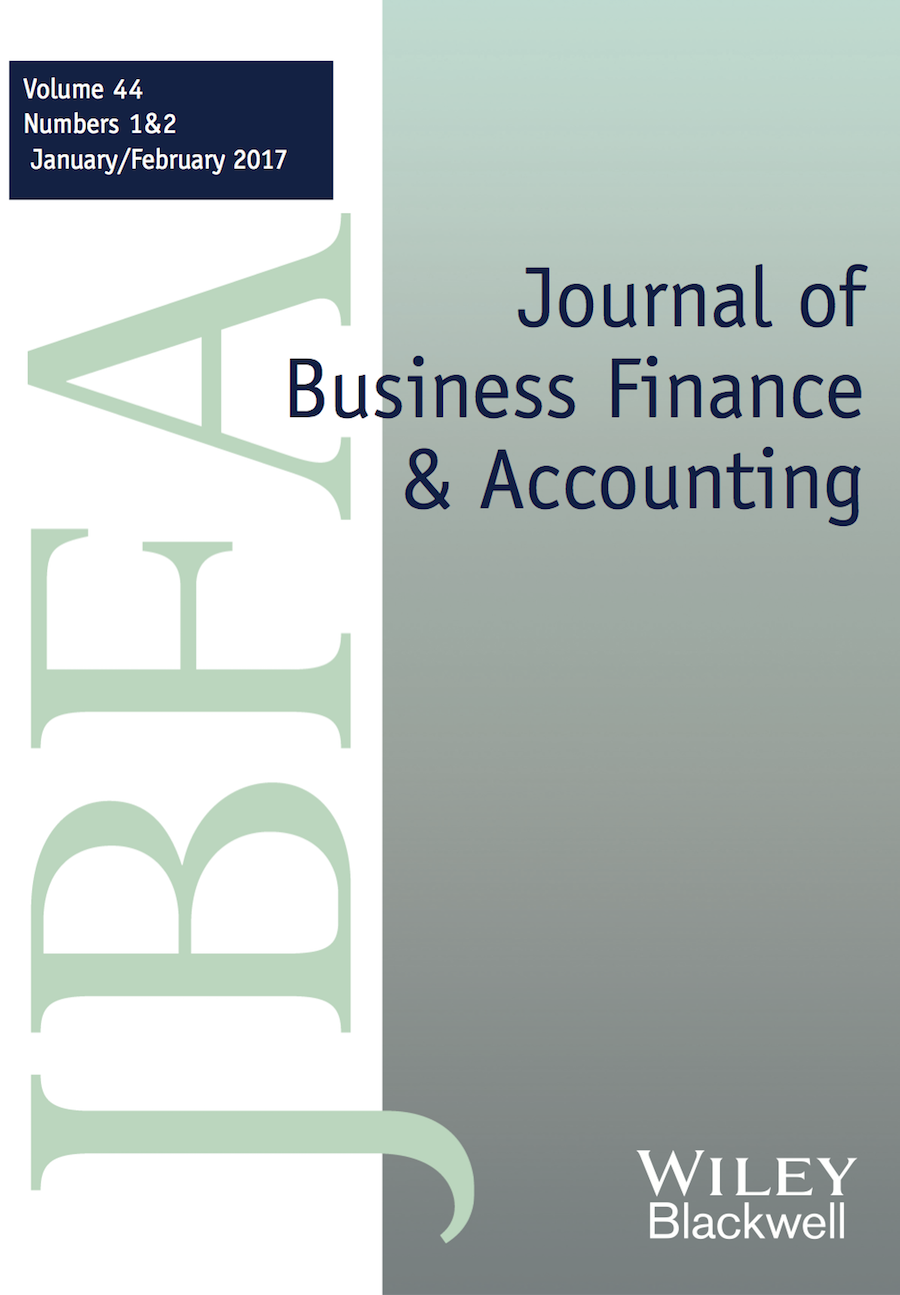
State Ownership and Financial Statement Comparability
in: Journal of Business Finance and Accounting, im Erscheinen
Abstract
Abstract This paper investigates how state ownership affects financial reporting practices in China. Using several measures of state (government) ownership, we show that a one-standard-deviation increase in state ownership decreases financial statement comparability by 36.61%, and the impact is more pronounced when the central authority has majority control of the company. Moreover, lower earnings quality and lower levels of accounting conservatism among state-owned enterprises (SOEs) may explain the lower accounting comparability between SOEs and non-SOEs (NSOEs). Additionally, similar (different) managerial objectives converge (diverge) financial statement comparability between SOEs and NSOEs. Last, the geographical locations of firms also contribute to financial statement comparability. We employ a difference-in-differences design, changes regression and entropy balancing to mitigate potential endogeneity bias.

Disentangling Stock Return Synchronicity From the Auditor's Perspective
in: Journal of Business Finance and Accounting, im Erscheinen
Abstract
Abstract This paper investigates a firm's stock return asynchronicity through the auditor's perspective to distinguish whether this asynchronicity can proxy for the company's firm-specific information or the quality of its information environment. We find a significant and positive association between asynchronicity and audit fees after controlling for auditor quality and other factors that affect audit fees, suggesting that stock return asynchronicity is more likely to capture a company's firm-specific information than its information environment. We also find that asynchronous firms are more likely to receive adverse opinions on their internal controls over financial reporting, but are associated with lower costs of capital and auditor litigation, providing further evidence in support of the firm-specific information argument. Asynchronicity's positive association with audit fees is driven by firms with higher accounting reporting complexity, suggesting stock return asynchronicity captures a firm's complexity, resulting in more significant efforts by the auditor.

The Corporate Investment Benefits of Mutual Fund Dual Holdings
in: Journal of Financial and Quantitative Analysis, im Erscheinen
Abstract
Mutual fund families increasingly hold bonds and stocks from the same firm. We present evidence that dual ownership allows firms to increase valuable investments and refinance by issuing bonds with lower yields and fewer restrictive covenants, especially when firms face financial distress. Dual holders also prevent overinvestment by firms with entrenched managers. Overall, our results suggest that mutual fund families internalize the agency conflicts of their portfolio companies, highlighting the positive governance externalities of intra-family cooperation.
Arbeitspapiere
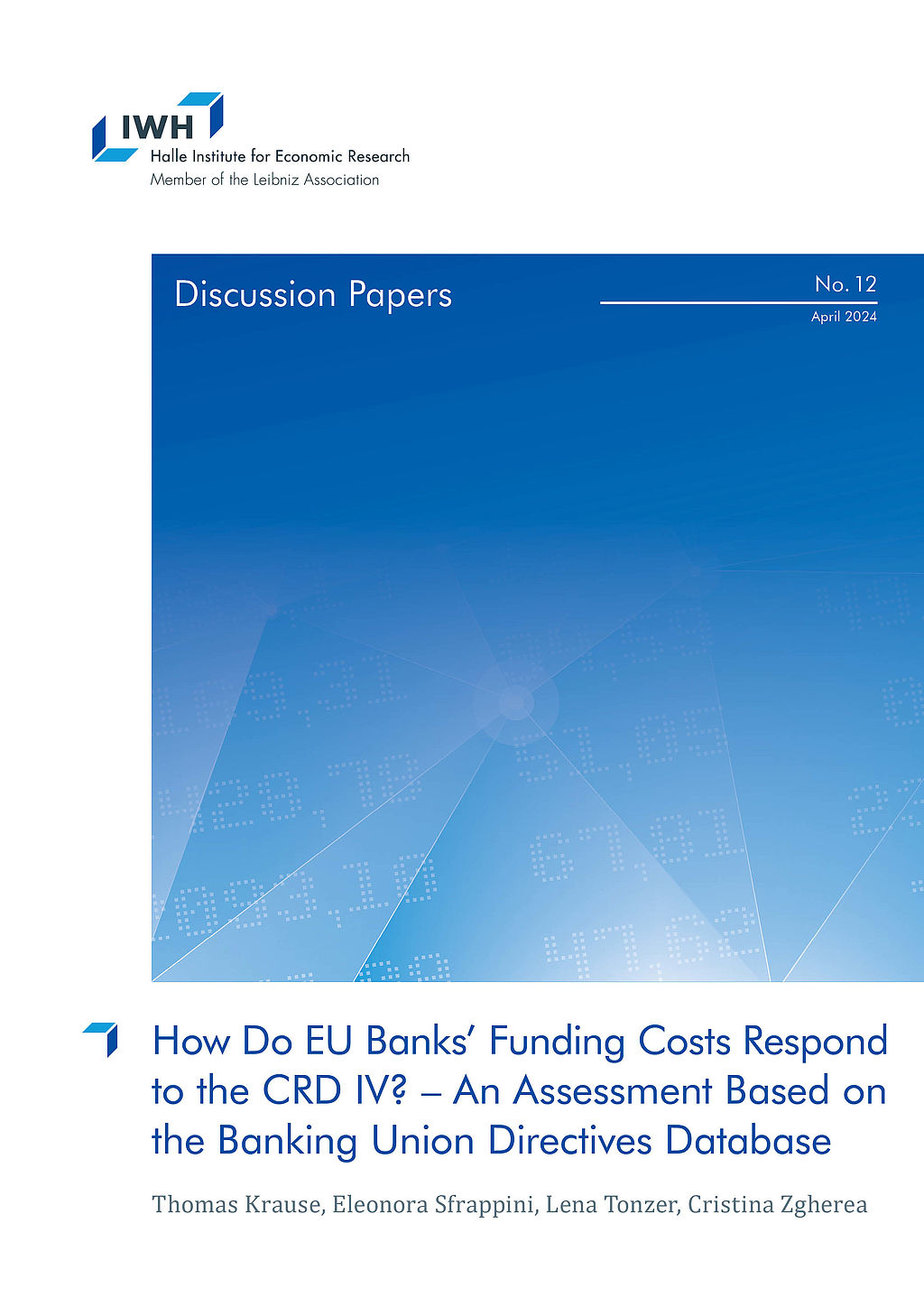
How Do EU Banks’ Funding Costs Respond to the CRD IV? An Assessment Based on the Banking Union Directives Database
in: IWH Discussion Papers, Nr. 12, 2024
Abstract
The establishment of the European Banking Union constitutes a major change in the regulatory framework of the banking system. Main parts are implemented via directives that show staggered transposition timing across EU member states. Based on the newly compiled Banking Union Directives Database, we assess how banks’ funding costs responded to the Capital Requirements Directive IV (CRD IV). Our findings show an upward trend in funding costs which is driven by an increase in cost of equity and partially offset by a decline in cost of debt. The diverging trends are most present in countries with an ex-ante lower regulatory capital stringency, which is in line with banks’ short-run adjustment needs but longer-run benefits from increased financial stability.
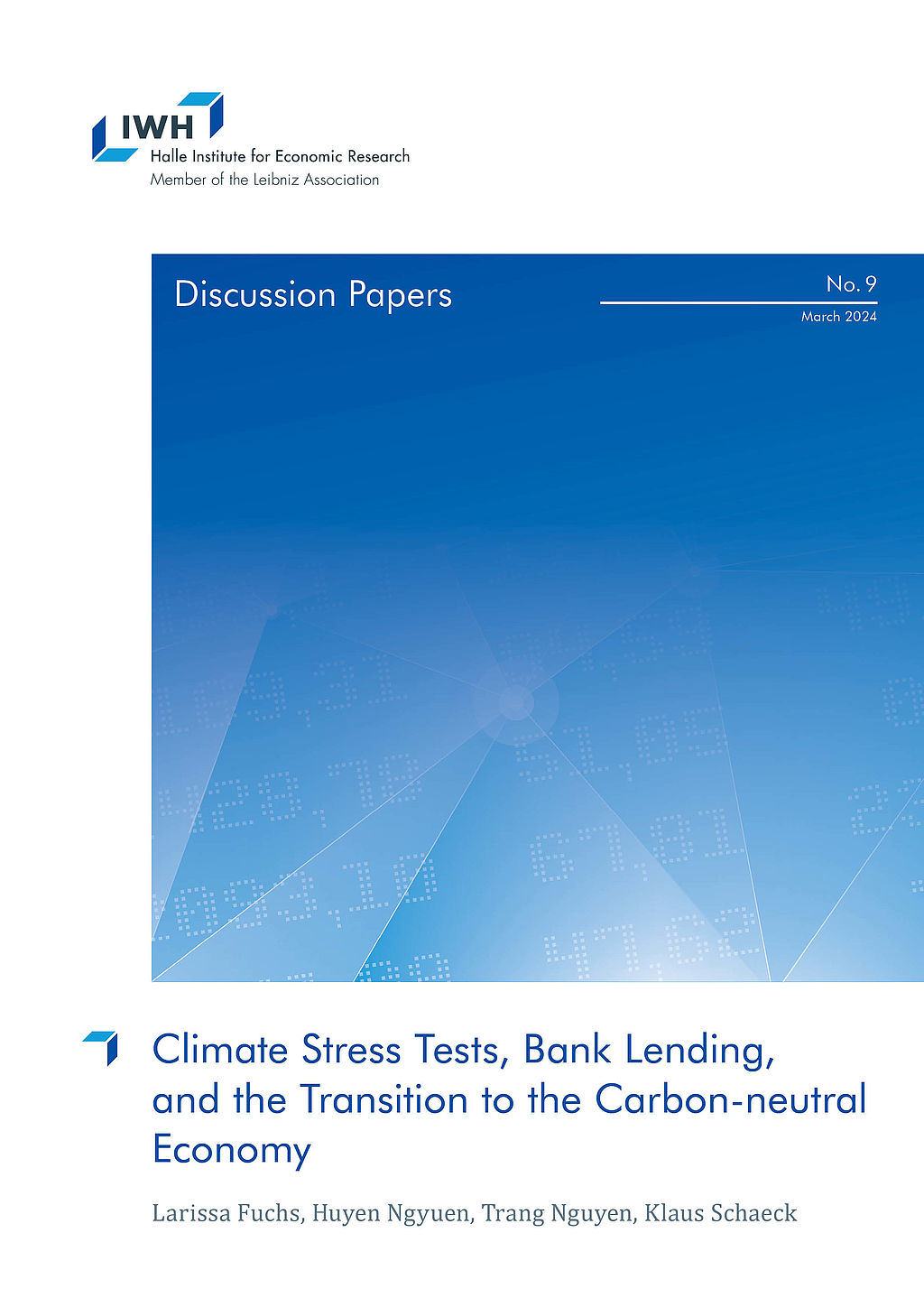
Climate Stress Tests, Bank Lending, and the Transition to the Carbon-neutral Economy
in: IWH Discussion Papers, Nr. 9, 2024
Abstract
Does banking supervision affect borrowers‘ transition to the carbon-neutral economy? We use a unique identification strategy that combines the French bank climate pilot exercise with borrowers‘ carbon emissions to present two novel findings. First, climate stress tests actively facilitate borrowers‘ transition to a low-carbon economy through a lending channel. Stress-tested banks increase loan volumes but simultaneously charge higher interest rates for brown borrowers. Second, additional lending is associated with some improvements in environmental performance. While borrowers commit more to reduce carbon emissions and are more likely to evaluate environmental effects of their projects, they neither reduce direct carbon emissions, nor terminate relationships with environmentally unfriendly suppliers. Our findings establish a causal link between bank climate stress tests and borrowers‘ reductions in transition risk.
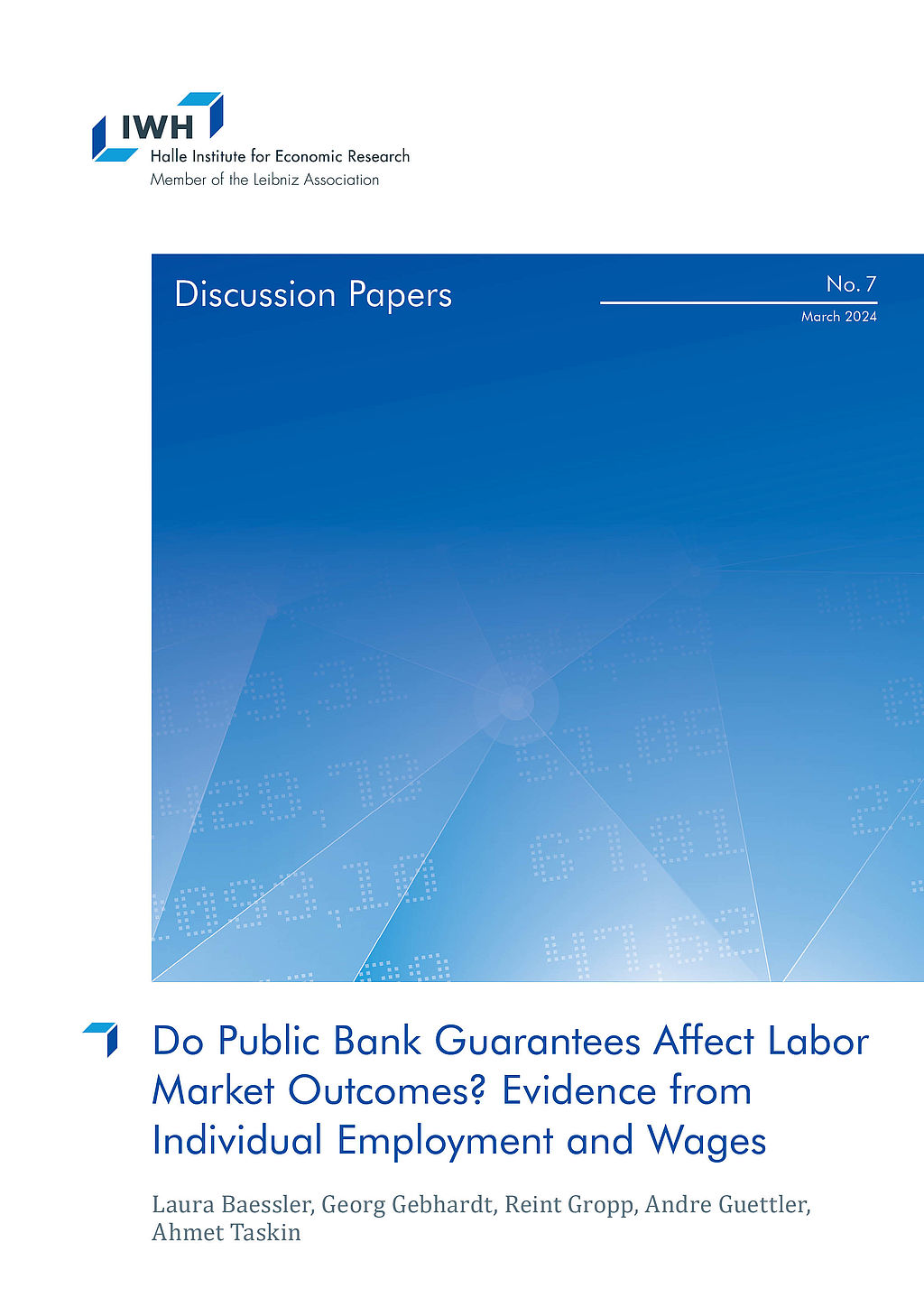
Do Public Bank Guarantees Affect Labor Market Outcomes? Evidence from Individual Employment and Wages
in: IWH Discussion Papers, Nr. 7, 2024
Abstract
We investigate whether employees in Germany benefit from public bank guarantees in terms of employment probability and wages. To that end, we exploit the removal of public bank guarantees in Germany in 2001 as a quasi-natural experiment. Our results show that bank guarantees lead to higher employment, but lower wage prospects for employees after working in affected establishments. Overall the results suggest that employees do not benefit from bank guarantees.
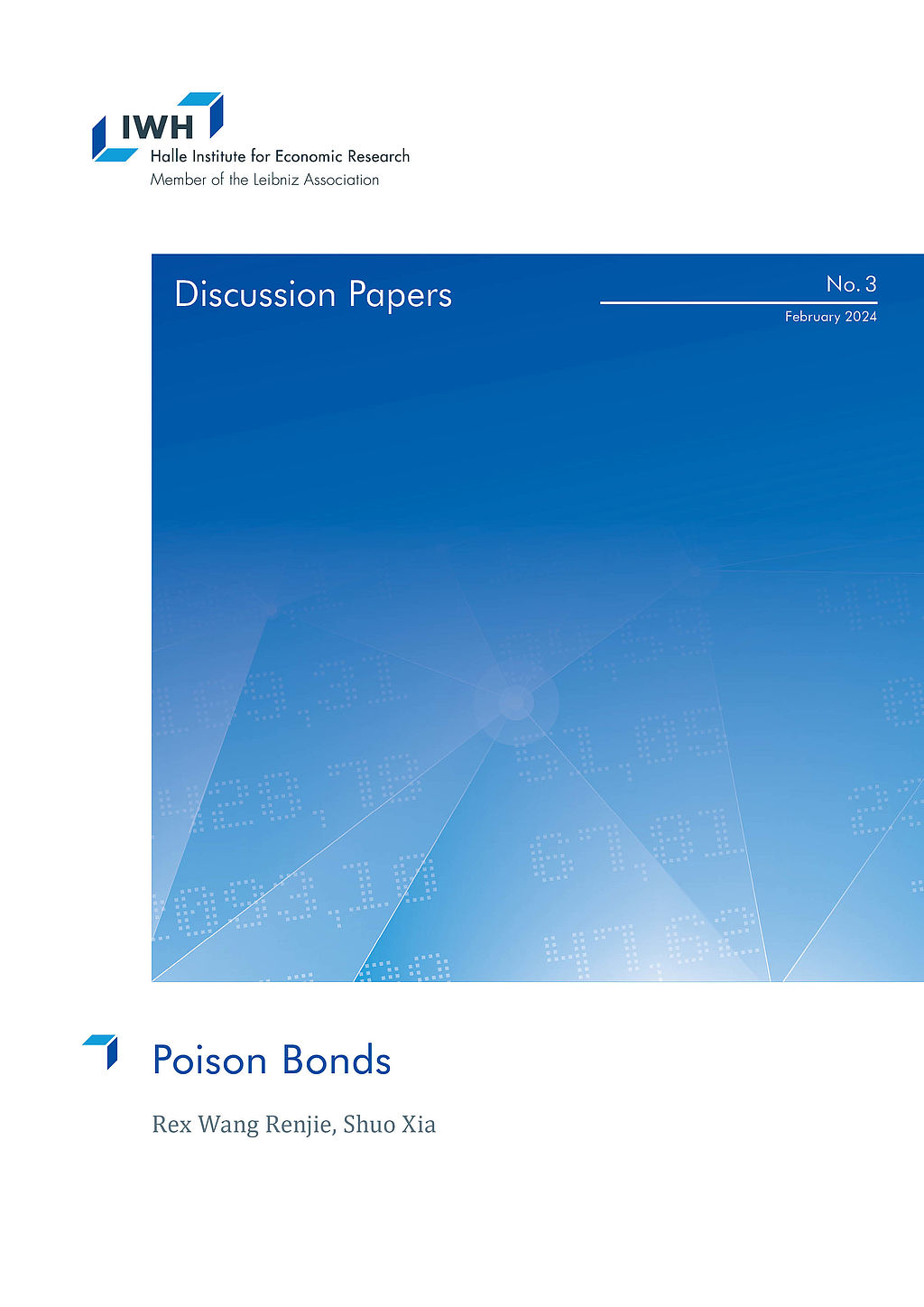
Poison Bonds
in: IWH Discussion Papers, Nr. 3, 2024
Abstract
This paper documents the rise of “poison bonds”, which are corporate bonds that allow bondholders to demand immediate repayment in a change-of-control event. The share of poison bonds among new issues has grown substantially in recent years, from below 20% in the 90s to over 60% since mid-2000s. This increase is predominantly driven by investment-grade issues. We provide causal evidence that the pressure to eliminate poison pills has led firms to issue poison bonds as an alternative. Our analysis suggests that this practice entrenches incumbent managers and destroys shareholder value. Holding a portfolio of firms that remove poison pills but promptly issue poison bonds results in negative abnormal returns of −7.3% per year. Our findings have important implications for the agency theory of debt: (i) more debt may not discipline the management; and (ii) even without financial distress, managerial entrenchment can lead to agency conflicts between shareholders and creditors.
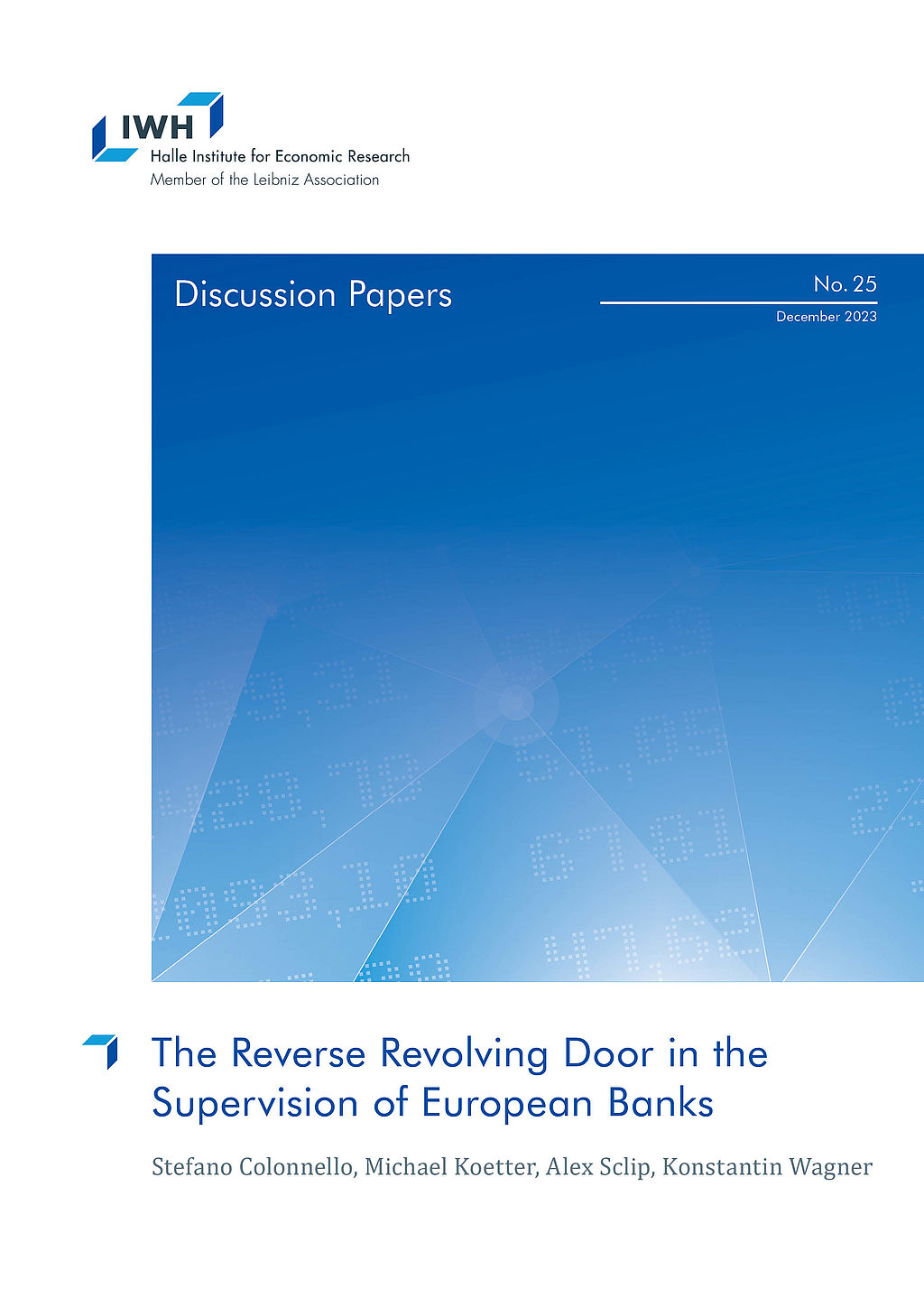
The Reverse Revolving Door in the Supervision of European Banks
in: IWH Discussion Papers, Nr. 25, 2023
Abstract
We show that around one third of executive directors on the boards of national supervisory authorities (NSA) in European banking have an employment history in the financial industry. The appointment of executives without a finance background associates with negative valuation effects. Appointments of former bankers, in turn, spark positive stock market reactions. This „proximity premium“ of supervised banks is a more likely driver of positive valuation effects than superior financial expertise or intrinsic skills of former executives from the financial industry. Prior to the inception of the European Single Supervisory Mechanism, the presence of former financial industry executives on the board of NSA associates with lower regulatory capital and faster growth of banks, pointing to a more lenient supervisory style.









































